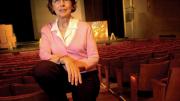Some days it went like this:
Lil: We're looking at a three-year-old. Things that people are doing for us. How do you feel about it?
Elinor: I feel good about it. What about you?
Lil: Fabulous. For five years, all the things we did. Could. Hope to do.
Elinor: Uh-huh. What do we hope to do?
Lil: Well, I just called Parliament and they're on their way.
When Elinor Fuchs ’55 recorded this conversation with her mother, Lil had already lived with Alzheimer’s disease for eight years and was fast moving from a state of “confusion to delirium.” Their strange dialogues, Fuchs saw, were not unlike those in many plays she knew from the surrealists and the “absurdists,” such as Beckett and Ionesco. “From my theater training, I’m comfortable slipping into alternative realities and finding something charming where other people might be appalled,” says Fuchs, a professor at the Yale School of Drama
“Now, I am not saying that Alzheimer’s is charming. But I had a default drive in which I was able to convert my mother into a kind of artist,” she continues. “Mother also became very playful herself, so there was a sort of synergy going on between usespecially in our conversations, which could be so wonderful, so zany. So why not see her as a poet of fractured language? The object was not to translate it into something meaningful to me, but to play with the range of meanings.”
Her mother once asked: “Is this a play? Is this a game? Or is this reality?” “I thought this was a stunning question,” Fuchs explains. “Maybe I should have said, ‘It’s a gamewhat are the rules?’ Or ‘A play: what’s the plot?’ But I lamely said, ‘It’s reality, mother.’” When Fuchs instead began to apply her theatrical imagination, “It gave me a way of coping, of living with the situation, that had a little creativity in it. Otherwise, it could be deathly to visit her.” The insight helped bring the two women closer than they had ever been. “In those last four years,” Fuchs says, “I loved her more, though I knew her less.”
These experiences are described in Fuchs’s most recent book, Making an Exit: A Mother-Daughter Drama with Alzheimer’s, Machine Tools, and Laughter. “Thornton Wilder wrote, ‘On the stage, it is always now,’” she explains. The interactions she had with her mother, Lillian “Lil” Kessler ’29, were improvisational: Fuchs responded flexiblyor humorouslyto whatever reality her mother believed at the moment, which benefited them both. Even deep into the illness, Lil appreciated a good laugh.
Fuchs was also adept at switching roles. At one point toward the end of her life, Kessler sat in her daughter’s lap and purred, “I love you.” Fuchs held her and spoke in soothing, baby-voiced tones. “She would call me her mother and I began to grow into that,” Fuchs reports. “I finally concluded it made no difference which way care was flowing, it was care, and it established a bond that, I have to say, would never have been a part of my human lexicon had she died in a car crash 15 years earlier.”
The book is also about coming to love a difficult person. For much of her life, Kessler was a successful businesswoman in a man’s field: she ran a company that sold automotive parts, machine tools, and paramilitary equipment, primarily in the Middle East and Asia. She loved to “dress smart,” travel, give parties, and entertain friends by playing the piano. Fuchs’s parents divorced early on. “When they separated, my father became distant in my life,” Fuchs says. Lil was not much better. She left her only child with grandparents from age seven to 10. Even after they reunited, Fuchs spent most of her adolescence and adulthood aching with confusion over what to feel about her mother. To Lil, “‘Love’ was one of the soft-creepy words like ‘God,’ ‘soul,’ ‘woman,’ and even ‘mother,’” Fuchs writes. “With her booming voice, her high energy, her self-promotion, her drive for success, her critical intelligence, her scorn for stupidityin any given room, Mother took up all the air there was.” In short, Lil was “a good old narcissist.”
 |
| A younger, no less exuberant Lillian "Lil" Kessler |
Since her book’s publication last year, Fuchs has read and lectured widely: for Alzheimer’s and caregivers’ organizations, at Yale Medical School, and at assisted-living facilities around New England, where she made some interesting discoveries about dementia care. In one facility, staff members had set up a series of “life-work stations”: a table on which to fold laundry, a typewriter on a desk, and even a “grocery store” with carts and a few shelves of food. “What they’ve found is that whenever some of the older women were feeling agitated and anxious, it often helped them to do a familiar task that their hands remembered, even if their minds did not,” Fuchs says. “This is theater. The whole staff is trained in doing thisthis letting go of a strict realityand everyone is much happier.”
When Lil was 84, Fuchs moved her to the dementia unit of a nursing home. There, Lil and a fellow patient, Harry Blue, fell in love. They often sat together holding hands and smiling, their eyes closed. One day they mistakenly wore each other’s dentures. For Fuchs, the couple embodied what one of her professors had once said about playwright Henrik Ibsen: “He never gave up on the possibility for human growth. And that is what accounts for the fact that in the last moment of the last act something would happen, like Nora suddenly walking out of the marriage,” she explains. “I think Making an Exit has that same spirit, in that my mother in the last few months of her life had this love affair. For me, it’s about never losing sight of the possibility that someone can change.”
~Nell Porter Brown






